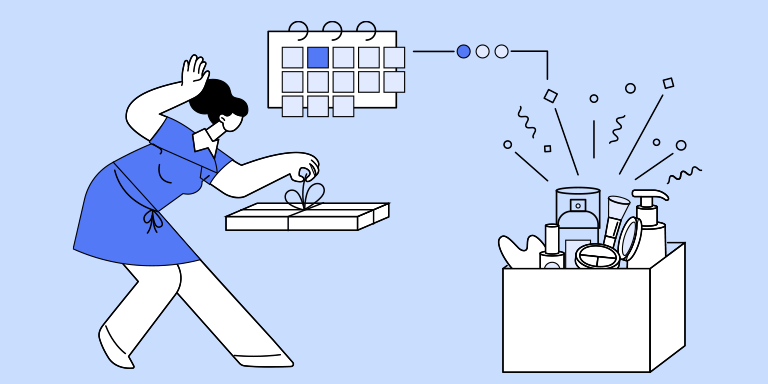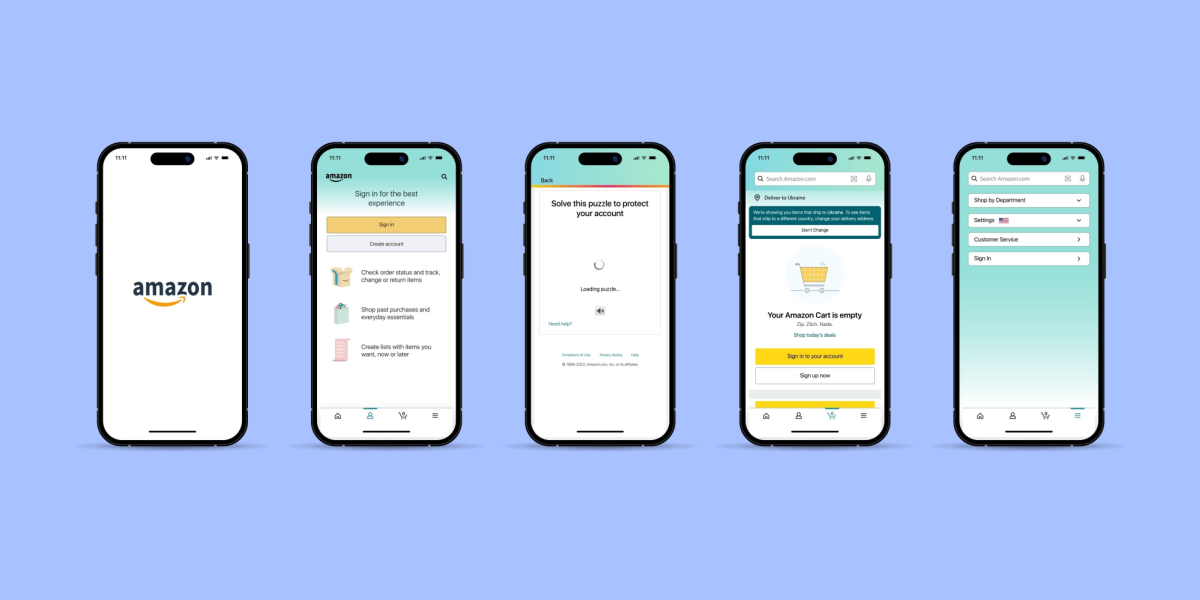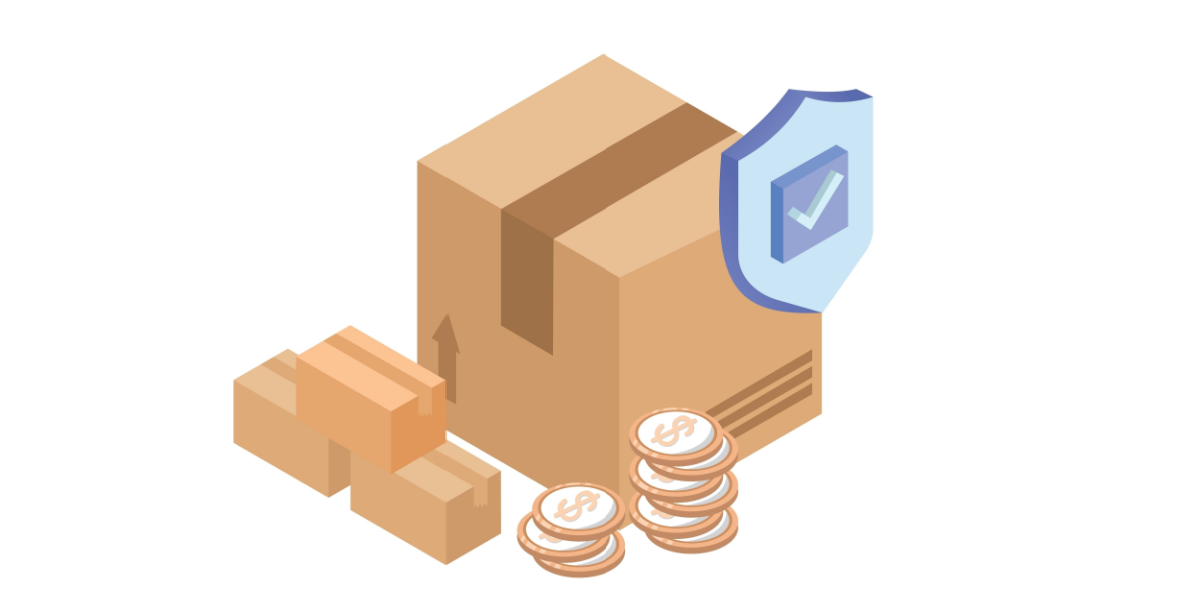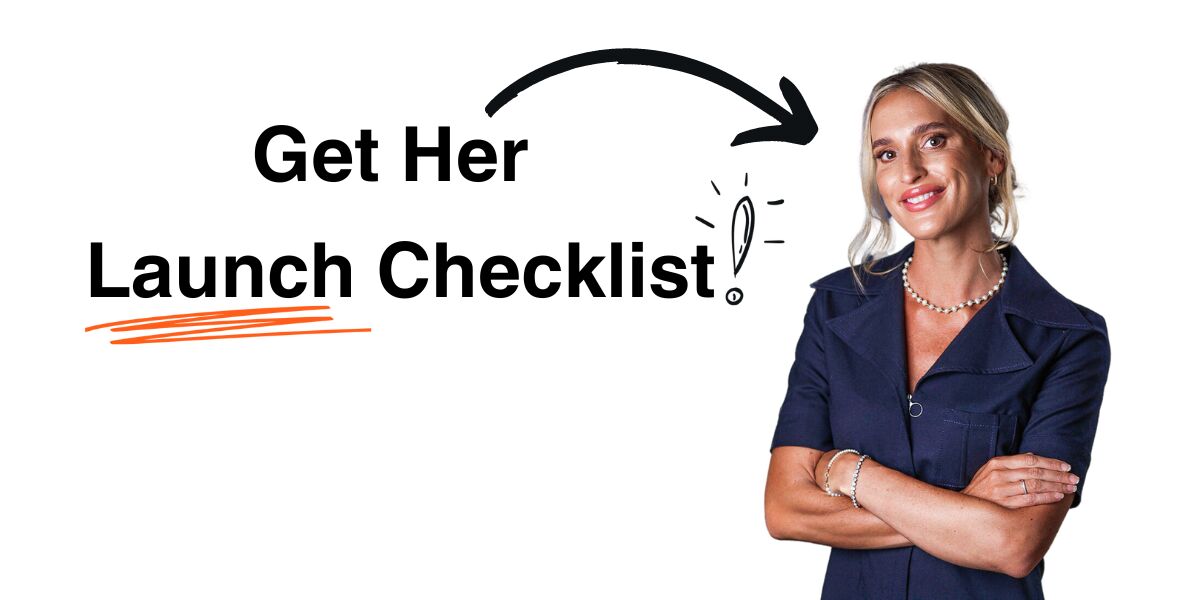By 2027, there will be more freelancers than full-time workers. If you’ve ever wanted to unchain yourself from your desk, break up with your horrible boss and join the land of the free, there’s never been a better time.
While such statistics might tell you to go for it, your inner voice might be telling you otherwise. What about your mortgage, it might say. Or those clients you don’t yet have? Or how on earth can you make a living, when there’s literally thousands of people offering the same service on Freelancer.com for a 1/100th of what you’d need to charge to even get by?
You want to learn how to become an entrepreneur, and freelancing a great place to start, but you’re feeling a bit nervous. We get it. The solution is preparation.
And while the internet is filled with articles on the traits required to be a freelancer or an entrepreneur, there aren’t many on the actual skills required to make that leap. Traits like the ability to focus on performance and deal with stress are important, but skills are the more practical side of the equation.
Skills are the “how” of the freelancing. They’re what take us from the shackles of our workplace one day, to living the lifestyle we know we deserve (and earning the same, if not more money doing so).
So without further ado, here are the five skills you need to start and succeed as a freelancer—and how you can acquire them.
EXCLUSIVE FREE TRAINING: Successful Founders Teach You How to Start and Grow an Online Business
Essential Skill #1: Freelance-Friendly Talent
If you want to embrace the freelancer lifestyle, the first thing you need is a skill that lends itself to being done by a freelancer or remote worker. The litmus test for this is, loosely, can the job be performed equally well from anywhere, at anytime?
While technology is rapidly making it possible to do more jobs remotely—for example, you can be a remote receptionist or even an online doctor—there are some jobs that simply cannot be done remotely. These jobs usually involve having to physically do something. For example, you simply can’t give an injection as a remote nurse, or drive a truck remotely (yet).

If you’re feeling stumped, a great place to start is one of the big freelancers sites, for example, Upwork, Freelancer or Fiverr. If your preferred profession is listed as a service on these sites, rest assured there’s sizeable demand for your talent of choice.
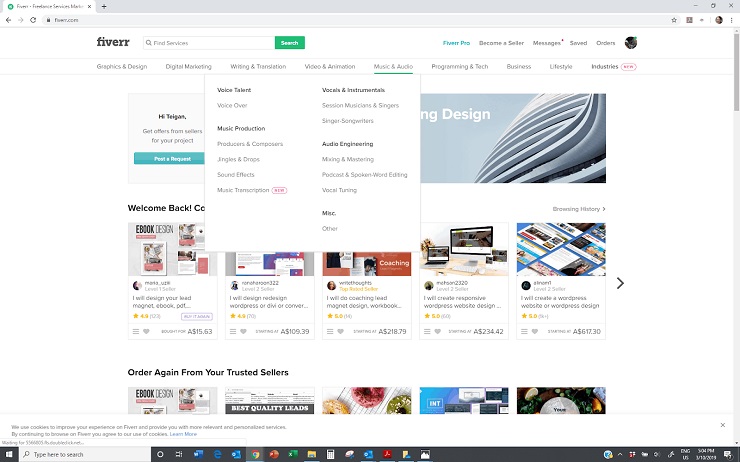
Even if your particular talent doesn’t appear on these websites, it doesn’t mean that you can’t be a freelancer. It just means you might have to work a bit harder to obtain clients.
If you’re trying to figure out if there’s any demand for the service you want to offer, try searching more broad-based remote-working websites. This list of 25 sites is a great place to start. Alternatively, you can search for other individual freelancers in your field. If you don’t find anyone else like you, or you don’t find a job done remotely like the one you want to do, you don’t need to give up entirely, but know that establishing yourself might be a bit more challenging.
If you’ve discovered that your talent can be done remotely, that’s a big requirement to check off. Now the second (and arguably harder) part is verifying that your talent is one that someone would actually want to buy.
I’ve been freelancing full time as a copywriter and digital marketer under my business Fond Digital since 2016. In that time, I’ve often had to sub-contract overflow work to others. By the time I have to do this I’m usually frantic, frazzled, and staying up quite late to meet deadlines for my clients, so I usually hire on a first-come, first-serve basis.
Still, that’s worked out pretty well for me. Most people who advertise their services as freelancers are quite good, so whenever I have outsourced it’s worked out fine.
Except this one time.
I once outsourced a 10,000-word ebook to someone who approached me on LinkedIn. Always eager to give up-and-coming freelancers opportunities, I checked out his portfolio and it seemed decent, so I gave him the work.
What came back, friends, was like a word tornado.
Incoherent, rambling, and full of copy-pastes from Wikipedia, what I received was an abomination. Despite seven rounds of feedback, I still couldn’t salvage it, so I ended up having to rewrite the entire thing myself. Fortunately for him, I still paid him, despite the quality. Most clients I work with wouldn’t have paid a cent for what was produced.
What I’m saying here is not that you need to be exceptionally talented to be a freelancer. But at the same time, you can’t be abjectly terrible. So how do you really know how good you are?
Simple. Head to one of the big freelancing sites again, and find someone who’s advertising what you’re selling and has some good reviews. Then, get an honest friend to appraise their work relative to yours. If you’re comparable, great! You’ve got what it takes.
If you don’t feel like you are ready, take a class in the field you want to work in. Then, do some spec work so you can feel it out and practice.
Essential Skill #2: The Pitch
When it comes to freelancing, a lot of people think that the most talented people get all the work and make all the money.

Not true. One of the most essential steps to becoming an entrepreneur is nailing your pitch.
While of course there’s a correlation between your talent and the clients you attract, there’s an even bigger correlation between the work you do and your ability to pitch for that work. Let me put it this way: If you’re an average graphic designer, but exceptional at pitching, you will make double or triple what you’d make as a superstar designer with limited pitching skills. As a freelancer, you simply won’t have clients if you don’t proactively go out and find them, and then nail the pitch once you do.
Many people think that because so many websites now offer freelancers work, all you need to do is express interest in jobs and they’ll start rolling in. This couldn’t be further from the truth.
When you’re starting out, freelance websites can be useful to fine-tune your trade and build your portfolio. For example, when I was starting out as a freelance writer I wrote for Writer’s Domain. Despite the fact that I would regularly make a paltry $10-$15 an hour, it allowed me to build up some portfolio samples, and learn a lot about grammar and editing. (This was particularly important for me, as prior to freelancing, I didn’t have a formal education in either writing or marketing. I’d only ever worked in human resources!)
Although freelancing websites can be useful, they have downsides. These usually include the pay—it’s typically terrible and usually below minimum wage—and the competition.
As soon as you start pitching for higher-paying jobs, you’re up against thousands of others (remember, as freelance work is mostly remote, you literally have to compete with the rest of the world). What this means is that unless you have the exact experience a client is looking for, they won’t hire you, and often even if you do, they’ll be able to find someone cheaper. In a nutshell, you’ll spend a lot of time pitching for jobs you won’t get.
This is a problem because as a freelancer, time is money, literally. If you’re not working on paid client work, you’re not getting paid, so you need to make sure you’ve got a healthy ratio between pitching and actual paid gigs.
So how do you achieve this? The best way is to approach local clients directly (i.e. not through a freelancing website), with a perfectly nailed pitch that shows you’re a specialist:
This might go something like this:
1. Get experience in a particular niche
Let’s say you’re a website designer and you want to work with green brands. The best way to get green brands on board is to show them other green brands you’re working with! This, however, can be a chicken and egg situation if you don’t have any experience.
To overcome this, you might need to create something from scratch yourself (for example, a mock-up website), or alternatively, build your portfolio in a more meaningful way by helping a nonprofit through skilled volunteering.
2. Display your portfolio in a professional manner
Many (most) freelancing roles require a good-to-exceptional knowledge of digital. For example, if you’re advertising your services as a website designer and you don’t personally have a well-designed website, well, it’s not the best look.
Once you’ve got your portfolio items sorted, make sure you display them convincingly online. Note that you don’t need in-depth expertise to do this. A simple Squarespace or Wix site will suffice, as long as it looks and sounds the part.
Simultaneously, you’ll need to get your social media accounts sorted as, again, it’s all about first impressions. If you’ll be approaching people via LinkedIn, make sure you add your portfolio samples to your profile, and ensure that your profile positively portrays your freelance experience.
3. Shortlist potential clients
Next, you’ll need to create a shortlist of potential clients in your niche. Then, try and find the decision-maker on LinkedIn or through the client’s website. An introduction to the right person will massively help your chances of getting through.
4. Send your targeted, personalized pitch
Once you’ve located the decision-marker, send them an invite to connect on LinkedIn (or email them, if you have their email address). Here, it’s critical to write a personalized message with proof you’re the person they need, even if they might not be looking right now.
For example, if you’re adding a founder or marketing manager of a green brand, you might say something like, “Hey, I’m Teigan, and I’ve been working with brands including to design their websites, here’s an example . Let me know if you need any help in this space.”
5. Follow up
You might think that there would be a low chance of securing clients this way. What would be the chances of them needing help at the exact time you approach them?
But you’d be surprised. Approaching people directly like this is extremely beneficial, as if the client does need someone, suddenly a) they don’t need to look for anyone, as they already have your details and know you can do the job! and b) you’ve got no competition! Your chances of nailing the job will skyrocket.
And even if they don’t need you right now, you can always follow up later. Over the three years I’ve been freelancing, I’ve acquired nearly 90% of my clients by doing exactly this, or following up a few months or even years later to see if they need help.
Here’s even more detailed information on how to find and secure high-paying clients.
EXCLUSIVE FREE TRAINING: Successful Founders Teach You How to Start and Grow an Online Business
Essential Skill #3: Business and Commercial Acumen
Talent will get you started. Pitching will win you clients. But unfortunately, there’s still more steps to becoming an entrepreneur that you’ll need to master. You see, when you’re freelancing, you’re your own business. So you need the skills to run it.
Broadly, there are two types of business and commercial skills you need to run your freelancing business, and they are contracts (how you price your work), and finance/admin (how to ensure you get paid and then pay your tax). I’ll explore each below:
Contracts
As a freelancer, there’s no finance department to help you. There’s no legal department to create a contract for your services (for a ready made one though, see here). You’re all on your own and your clients will expect the highest degree of professionalism. So this means you’ll need to come to them with a quote and terms and conditions, and be prepared to deliver on (and enforce), what you’ve laid out.
As a freelancer, quoting is a confusing process. Do you quote high and hope for the best? Do you provide a low quote in the hope of ongoing work? Do you price based just on the time to deliver, or do you add in extra hours for project and client management? What happens if the client wants hundreds of revisions?
Unfortunately, there’s no easy answer to this question: good quoting is a skill that only comes with experience and even then, it’s still always a gamble.
But as a guide, I’d recommend that you:
- Price on the slightly higher side to begin with. You can always negotiate if price is a barrier.
- Add in a margin of approximately 10-20% to account for client and project management.
- Put in place some solid conditions around revisions, for example, project includes one revision and any others are charged at an hourly rate.
- Specify your payment terms in the beginning, and always ask for a deposit upfront.
Here’s some more information on how to figure out what to charge clients.
Finance/Admin
It’s unlikely that most freelancers get into the game so they can experience the joy that is the administrative side of their business.

But unfortunately, being a one-person show means you don’t have a choice. Understanding how to chase payments if required, reconcile your bank accounts, and pay your own taxes is an essential skill of freelancing.
How you manage your this side of your business will depend on what country you’re in, but broadly, you need to know how to:
1. Chase money and put someone in debt collection
In my three years of freelancing, I’ve (fortunately) only had one non-paying client. But one was enough to produce many sleepless nights. After months of chasing to no avail, I finally put his account into debt collection, only to have him completely ghost me.
While you can’t avoid this situation altogether, you do need to know how to put a solid plan in place to chase money and take legal action, if need be.
2. Reconcile your bank account
Keeping on top of client payments is critical—you always want to know if a client is paying late so you can manage accordingly. The best way to do this is through an accounting system such as Xero or Quickbooks. If you don’t know how to use one, invest the time in learning or find yourself a good bookkeeper to help.
3. Pay taxes
As a freelancer, it’s easy to feel like you’ve got a lot of cash, as all payments you’ll receive are pre-tax. But if you treat all of your income as spendable, you’ll likely get in a lot of trouble at the end of the year when you realise you’ve got a big tax debt to pay.
To avoid this situation, either estimate and save the tax you’ll owe using a country-specific tool like this one for Australia, or sit down with your accountant at the start of the year to do some tax planning. The last thing you want it to have a massive debt hanging over your head!
Commercial and administrative skills might not be the most fun thing to develop, but they are still just as essential to keeping your business thriving.
Essential Skill #4: Time Management
When I was working in a corporate job, I dreamed about all the freedom I’d have when I was freelancing. And while that came true—I am technically free to work whenever I want, from wherever—there is a small downside. The work still needs to be done. Because if it isn’t, I won’t get paid. Unfortunately, there are no lazy days, sick days, long lunches, or excuses as a freelancer. You either manage your time exceptionally well, or you don’t pay your mortgage.
Having said that, time management as a freelancer is certainly something that can be learned. To start, I’d recommend the following:
Plan to be productive for 80% of your day.
When I first started out, I’d kick myself if I couldn’t bill all eight hours of my day. But as I got more experienced, I realized that the quality of my work was suffering when I tried to do that, and clients noticed.
By giving yourself enough time in the day to eat lunch, take some short breaks and do the essential administrative tasks, you’ll be able to manage your time much better. And given the average person only works three out of eight hours every day, six is a pretty high bar to aim for!
If something you’re working on isn’t working out, stop, and return to it the next day (time permitting).
When we’re not motivated to do a task or feel it isn’t going to plan, we naturally procrastinate. The benefit of being a freelancer, though, is that at any one time, you should have multiple (hopefully more inspiring) tasks to work on.
If something isn’t working out for you, I’d advise you to stop straight away and start on something else, before you start procrastinating and wasting precious time. Fresh eyes and a new day on an otherwise uninspiring task might help you get the motivation you need to finish it.
Be selective with clients.
When you’re starting out as a freelancer, you need to take anything you can get. While this might be true at the start, as soon as you’re able, try to work with clients/or on projects that motivate and inspire you. You’ll be much more productive this way.
Essential Skill #5: Assertiveness
When you think about the steps required to become an entrepreneur, this one might be the most surprising.
Throughout my freelancing career, I’ve had the pleasure of working with 100+ clients, and honestly, I can say that 99% of them have been absolutely delightful. But unfortunately, there will always be the 1%. A big learning curve for me has been figuring out how to deal with that 1% assertively, but professionally. As a freelancer, there’s no HR department to go to and no manager who’ll protect you. It’s just you and the client and ultimately, you need the outcome to be civil as at the end of the day, you want to get paid.
Assertiveness is a hard skill to learn, but in my experience, it comes down to listening and negotiation.
First, listening. If a client has an issue with something you’ve done, the first thing you need to do is hear them out. Avoid at all costs interjecting and defending your actions and work, or trying to blame them (even if it was their fault).
Then there’s the negotiation part, a big part of which is calculating the return on investment on your own time. With my 1% of troublesome clients, I’ve identified quite quickly that it simply wouldn’t be profitable for me to try and complete the jobs, so in a couple of cases I’ve forfeited final payment, or handed the work over at a discount and let them know I’m okay for them to find someone else. Did this mean I lost some money and a potential client? Sure. But to be honest, I would have lost more money trying to make them happy, so it was better to cut ties.
Most clients are amazing, but some aren’t. As a freelancer, you’ll definitely need the skill of knowing how to deal with the ones in the latter category.
EXCLUSIVE FREE TRAINING: Successful Founders Teach You How to Start and Grow an Online Business
How to Get the Skills You Need to Crush it as a Freelancer
The tough part of becoming a freelancing entrepreneur is that the traits you need, such as passion and discipline, are often an innate part of your personality (or not) and can be difficult to change.
But the skills? They’re easy. They can be learned!
Three-and-a-half years ago, I was sitting at my desk in a human resources job, with exactly zero of the skills I describe above, and exactly zero qualifications (and to be honest, not that much experience) in the area I wanted to freelance in. The thought that I’d ever write an article like this would have completely blown my mind.
But here I am, and there’s no reason why this can’t be you. With a bit of perseverance and perhaps a few targeted online courses, you’ll be on your way in no time.
Are you trying to start freelancing and change career direction at the same time? We’d love to hear your stories—share below!

